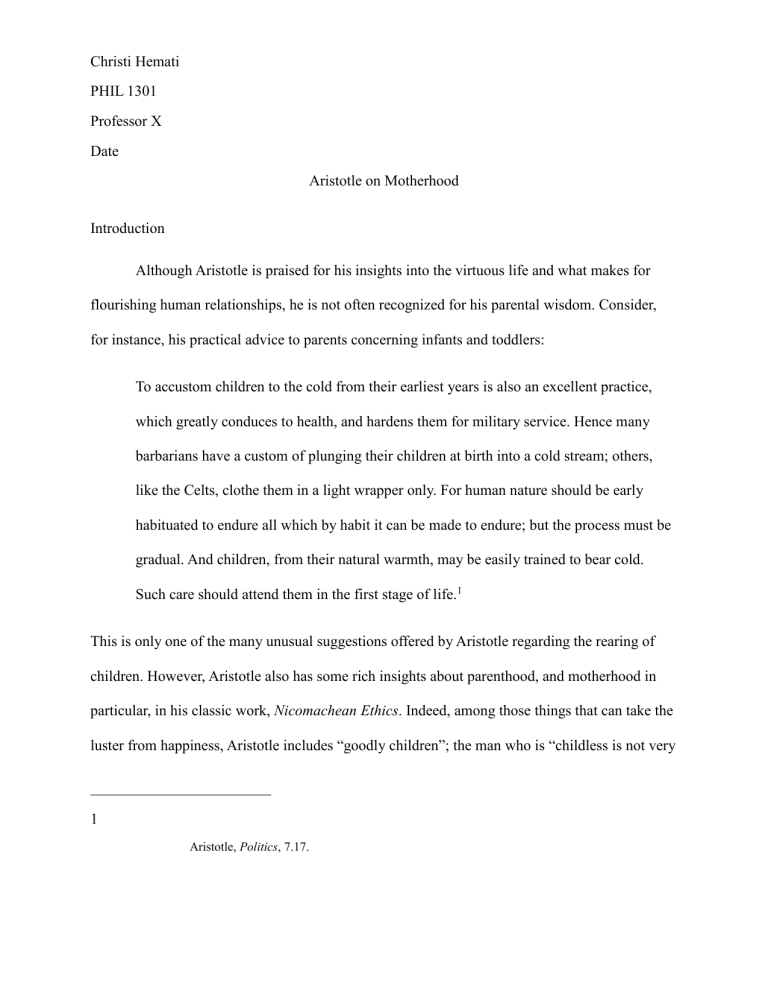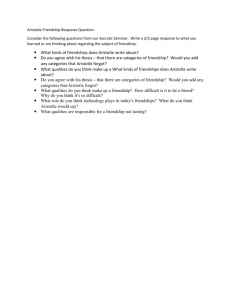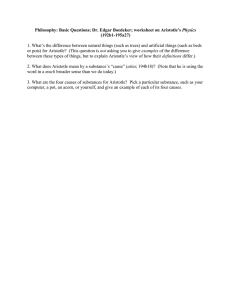Sample Paper - Aristotle on Motherhood.doc

Christi Hemati
PHIL 1301
Professor X
Date
Aristotle on Motherhood
Introduction
Although Aristotle is praised for his insights into the virtuous life and what makes for flourishing human relationships, he is not often recognized for his parental wisdom. Consider, for instance, his practical advice to parents concerning infants and toddlers:
To accustom children to the cold from their earliest years is also an excellent practice, which greatly conduces to health, and hardens them for military service. Hence many barbarians have a custom of plunging their children at birth into a cold stream; others, like the Celts, clothe them in a light wrapper only. For human nature should be early habituated to endure all which by habit it can be made to endure; but the process must be gradual. And children, from their natural warmth, may be easily trained to bear cold.
Such care should attend them in the first stage of life.
1
This is only one of the many unusual suggestions offered by Aristotle regarding the rearing of children. However, Aristotle also has some rich insights about parenthood, and motherhood in particular, in his classic work, Nicomachean Ethics . Indeed, among those things that can take the luster from happiness, Aristotle includes “goodly children”; the man who is “childless is not very
1
Aristotle, Politics , 7.17.
likely to be happy ... or had lost good children or friends by death” (1.8). Children also “seem to be a bond of union” between man and wife, “a good common to both and what is common holds them together” (8.12). This is why “childless people part more easily” (8.12).
In this investigation we will ask what kind of love parents have for their children in
Aristotle’s thought, and what the nature of motherly love is in particular. Do parents love their children simply because they are reflections of themselves? Or is the child loved for his own sake, as a being to be valued independently?
Self-Love and Selfless Love of Another
Aristotle claims that parental love, like all other loves, is grounded in love of self. In any friendly relationship, the good man “is related to his friend as to himself (for his friend is another self)” (9.4). Even the man who lovingly dies for his friend assigns himself the greater good because he “chooses nobility before all else,” and only secondarily benefits his friend (9.8). This priority of self-love is even greater in the case of parent and young child because the child’s well-being is not entirely separable from the parent, and this is why Aristotle contends that it is impossible to be unjust in an unqualified sense toward one’s child. A man’s child, “until it reaches a certain age and sets up for itself,” is a “part of himself, and no one chooses to hurt himself (for which reason there can be no injustice toward oneself” (5.6). This picture of parental love may appear egocentric, but the ideal lover of self is for Aristotle the best lover of his fellow man; for he desires what is noble instead of what seems advantageous, and is “always anxious that he himself, above all things, should act justly, temperately, or in accordance with any of the virtues” (9.8).
One of Aristotle’s best examples of such love is found in motherhood. He observes that most people aim at being loved rather than loving, and people delight in being loved for its own
sake. If friendship is also desirable for its own sake, Aristotle concludes, it would seem that friendship depends on being loved rather than loving. One cannot consider someone a true friend unless one is loved by that friend. While this is true, Aristotle argues that, on the contrary,
“friendship depends more on loving, and it is those who love their friends that are praised” (8.8).
Therefore, he continues, “loving seems to be the characteristic virtue of friends, so that it is only those in whom this is found in due measure that are lasting friends, and only their friendship that endures” (8.8). To illustrate this point, he points to maternal affection. “Some mothers,” Aristotle observes, hand over their children to be brought up, and so long as they know their fate they love them and do not seek to be loved in return (if they cannot have both), but seem satisfied if they see them prospering; and they themselves love their children even if these owing to their ignorance give them nothing of a mother’s due. (8.8)
Such a mother cares more about loving and providing for her child than being loved in return
(when she cannot have both); love of herself is the last thing on her mind.
But does this contradict Aristotle’s view that the best lover of another is first a lover of self? It appears not to be so: it is because of the mother’s proper love of herself that she recognizes the need to act in the most virtuous way toward her child. He explains this in the context of friendship: “For (1) we define a friend as one who wishes and does what is good, or seems so, for the sake of his friend, or (2) as one who wishes his friend to exist and live, for his sake; which mothers do to their children, and friends do who have come into conflict” (9.4).
2
2
“And in loving a friend men love what is good for themselves; for the good man in becoming a friend becomes a good to his friend. Each, then, both loves what is good for himself, and makes an equal return in goodwill and in pleasantness; for friendship is said to be equality, and both of these are found most in the friendship of the good” (8.5).
While such love is said to proceed from one’s relation to oneself, it is still for the friend’s or child’s sake, and not for one’s own, that he is loved. In this way, self-love gives birth to selfless love.
Reaching Proportion Among Unequals
One might ask at this point whether parental love can be so closely likened to the love of friendship. Isn’t friendship found between equals, while parents and young children relate to one another as unequals, at least in terms of maturity and experience? This difference is important.
Aristotle says again and again that equality of station, age, upbringing, education, and virtue is vital to ideal friendship. But, he also allows a place for what he calls unequal friendships, or
“friendships between dissimilars,” in which it is “proportion that equalizes the parties and preserves the friendship” (9.1). The mother-child relationship falls into this category. Unlike friendships of equality, neither mother nor child “gets the same from the other” or ought to seek it. Rather, when children render to parents what they ought to render to those who brought them into the world, and parents render what they should to their children, the friendship of such persons will be abiding and excellent. In all friendships implying inequality the love also should be proportional, i.e. the better should be more loved than he loves, and so should the more useful, and similarly in each of the other cases; for when the love is in proportion to the merit of the parties, then in a sense arises equality, which is certainly held to be characteristic of friendship. (8.7)
If the mother-child relationship is to flourish, each must love the other in proportion to their merits. What, then, is the merit or desert of the mother and child? We may further ask, if “the
better should be more loved than he loves,” which is the better, mother or child? Aristotle ascribes superiority to the parent. The mother is better and more useful. He explains,
The friendship of children to parents, and of men to gods, is a relation to them as to something good and superior; for they have conferred the greatest benefits, since they are the causes of their being and of their nourishment, and of their education from their birth; and this kind of friendship possesses pleasantness and utility also, more than that of strangers, inasmuch as their life is lived more in common. (8.12)
Parents are owed greater love by their children because they have bestowed goods that can never be repaid. For “in the matter of food we should help our parents before all others, since we owe our own nourishment to them, and it is more honourable to help in this respect the authors of our being even before ourselves” (9.2). In fact, the child stands in a position of infinite indebtedness:
This is why it would not seem open to a man to disown his father (though a father may disown his son); being in debt, he should repay, but there is nothing by doing which a son will have done the equivalent of what he has received, so that he is always in debt. (8.14) 3
From this text, it seems that Aristotle has made the difference between parent and child so great that bridging such a gap to form friendship would be impossible. How can such a relationship achieve the proportion that Aristotle requires of unequal friendships? No matter how much the child loves his mother, he can never love “in proportion to the merit” of the “author of [his] being.” Aristotle concedes this difficulty, and appears to alter his former claim about
3
Aristotle continues, “At the same time it is thought that presumably no one would repudiate a son who was not far gone in wickedness; for apart from the natural friendship of father and son it is human nature not to reject a son's assistance. But the son, if he is wicked, will naturally avoid aiding his father, or not be zealous about it; for most people wish to get benefits, but avoid doing them, as a thing unprofitable” (8.14).
meritoriousness when he states that “friendship asks a man to do what he can, not what is proportional to the merits of the case; since that cannot always be done, e.g. in honours paid to the gods or to parents; for no one could ever return to them the equivalent of what he gets, but the man who serves them to the utmost of his power is thought to be a good man” (8.14). The child cannot be expected to do the impossible, to return every sacrifice made by his parents on his behalf. Instead, each gets “more out of the friendship than the other—not more of the same thing, however, but the superior more honour and the inferior more gain; for honour is the prize of virtue and of beneficence, while gain is the assistance required by inferiority” (8.14). The child gains existence, nourishment, and love, and the parent receives honor in return.
4
Why is honor such an excellent good? It is for Aristotle the greatest external good; it is the reward and end of virtue (3.7, 4.3).
5
Uniqueness of Motherly Love
We have seen that Aristotle deals with the inequalities in the parent-child relationship by showing that (1) in friendships of inequality the superior or “better should be loved more than he loves,” (2) the parent is the superior, conferring the greatest of goods on her child, (3) these goods cannot be repaid, (4) but we should only ask that the child give what he can, and (5) the child receives gain while the parent receives honor. Another implication that follows from (1)
4
Aristotle explains, “The man who is benefited in respect of wealth or virtue must give honour in return, repaying what he can. For friendship asks a man to do what he can, not what is proportional to the merits of the case; since that cannot always be done, e.g. in honours paid to the gods or to parents; for no one could ever return to them the equivalent of what he gets, but the man who serves them to the utmost of his power is thought to be a good man (8.14).
5
Aristotle is aware that even honor can be loved to excess. This is why the man who possesses the virtue of proper pride does not put too much stock in it (4.3).
and (2) is that parents should be loved more than they love. However, according to Aristotle, the opposite is almost always the case. Not only do parents love their children more than they are loved in return, but mothers seem to love the most. Aristotle gives three reasons for this paradoxical love. First, “parents know their offspring better than their children know that they are their children” (8.12) Stronger epistemic access to the fact that one’s child is one’s own gives the parent more incentive to love the child. In this way, Aristotle adds, the mother loves more than the father, having greater certainty that the child is hers. Second, parental love is greater because of the length of time they have known their children. Parents love their children more because they have known them since they were born, while “children love their parents only after time has elapsed and they have acquired understanding or the power of discrimination by the senses” (8.12). Again, the mother’s love is greater than the father’s since her relationship with the child begins with pregnancy, whereas the father’s begins at birth (8.12).
The third and most insightful reason for this paradox is that “the originator feels his offspring to be his own more than the offspring do their begetter; for the product belongs to the producer (e.g. a tooth or hair or anything else to him whose it is), but the producer does not belong to the product, or belongs in a less degree” (8.12). This reasoning is best explained in the love benefactors have for those they have benefited. Just as the craftman “loves his own handiwork better than he would be loved by it if it came alive” and the poets dote on their poems
“as if they were their own children,” so also do parents become doting benefactors of their children (9.7): for that which they have treated well is their handiwork, and therefore they love this more than the handiwork does its maker. The cause of this is that existence is to all men a thing to be chosen and loved, and that we exist by virtue of activity (i.e. by living and acting), and that the handiwork is in a sense, the producer in activity; he loves his handiwork,
therefore, because he loves existence. And this is rooted in the nature of things; for what he is in potentiality, his handiwork manifests in activity. (9.7)
Parents look upon their child as a part of themselves, as their own handiwork and existence; the children bring the parents’ greatest potential into actuality. Again, this is particularly true for the mother, who nourishes the baby through pregnancy, births the baby from her own body, and if she is home with the child through its early years, becomes responsible for its intellectual, moral, and spiritual formation – she gives much of who she is potentially to her children. She labors lovingly as a gardener labors over his garden, and then takes joy and delight in the fruits of this labor, of her potential made actual in another. The very existence and activity of the child is the mother’s reward.
Conclusion
Is this motherly love at root a selfish love? Is the child merely a means for the mother to satisfy ambitions that she could not satisfy in her own life. One can imagine the sad picture of a mother obsessed with seeing her son excel in academics because the mother never could. But this is not the kind of motherly love Aristotle describes. Rather, Aristotle’s mother loves the child for his own sake, taking joy in his mere existence, ready to release him from her control when he is ready.
However, Aristotle’s framework may still not do justice to the kind of love displayed in motherly love. The problem is that for Aristotle, love is only appropriate when it is deserved; love for another is determined by the goodness and desirableness of the beloved. As a result, the mother should not love her child beyond his just deserts, that is, beyond what the child’s virtue merits. But this makes no sense of the mothers who, in Aristotle’s own words, “love their children even if these owing to their ignorance give them nothing of a mother’s due” (8.8).
Although Aristotle seems to have admiration for such sacrificial love on the part of mothers, he cannot make the kind of philosophical sense of it that the Christian can with Christ as the model.
As the Apostle Paul explains, “Very rarely will anyone die for a righteous man, though for a good man someone might possibly dare to die. But God demonstrates his own love for us in this:
While we were still sinners, Christ died for us.” 6
For Christians, a mother’s ideal love for her child approximates Christ’s love for sinners.
6
Rom. 5.7-8 NIV.


